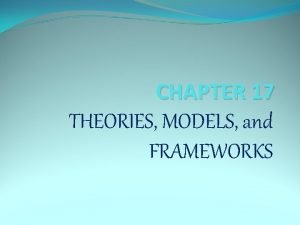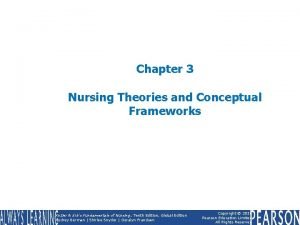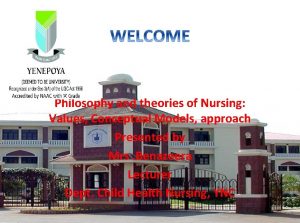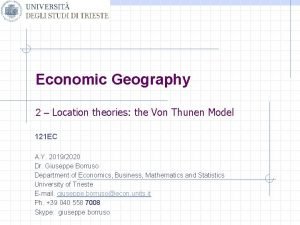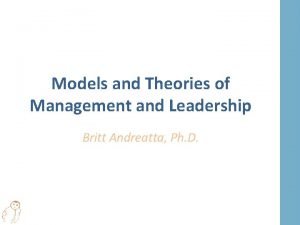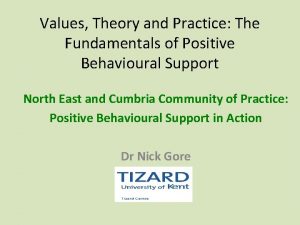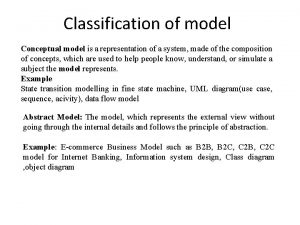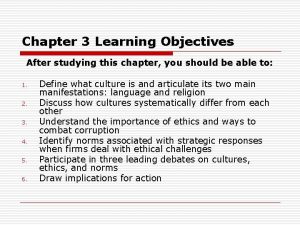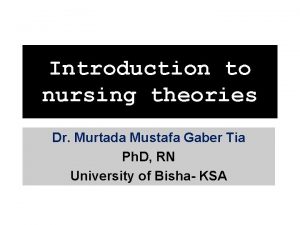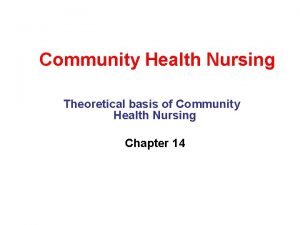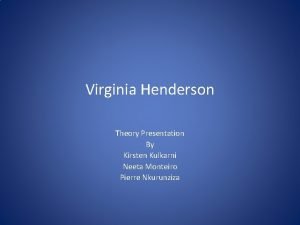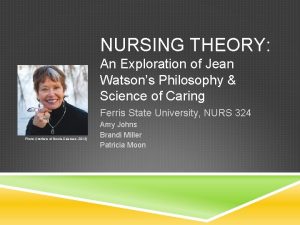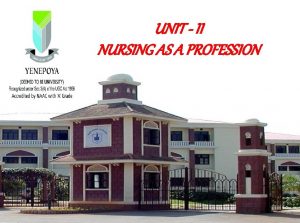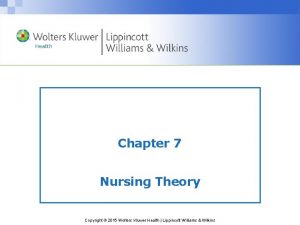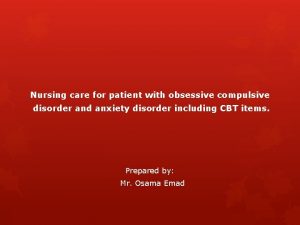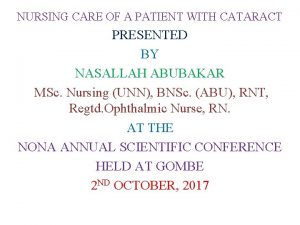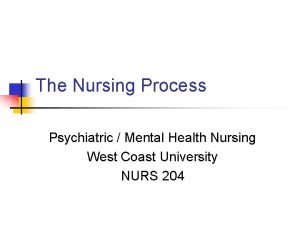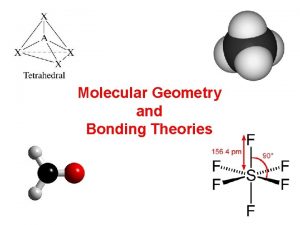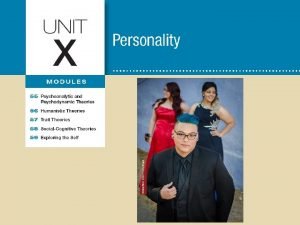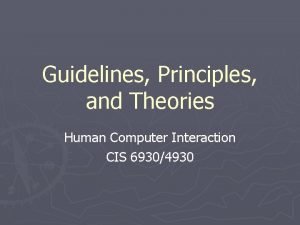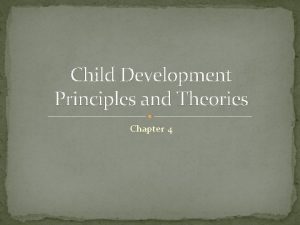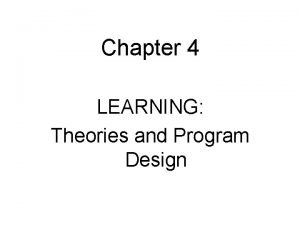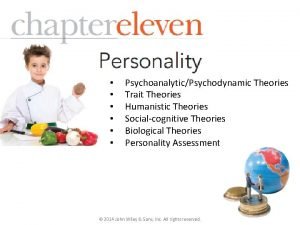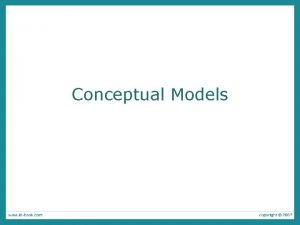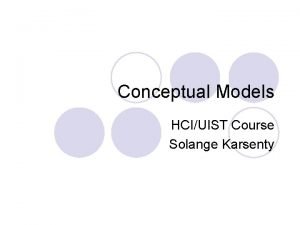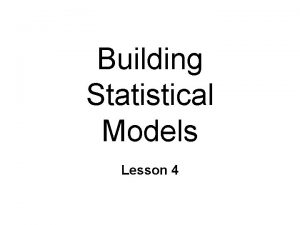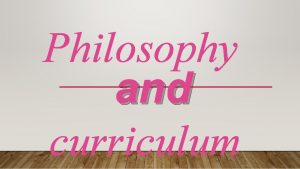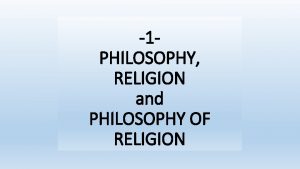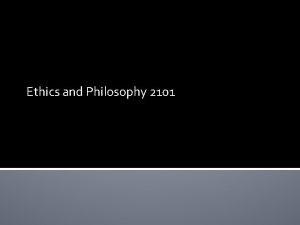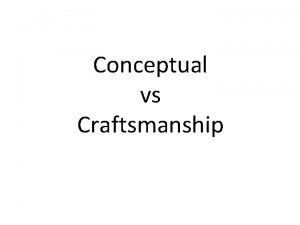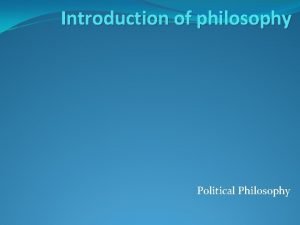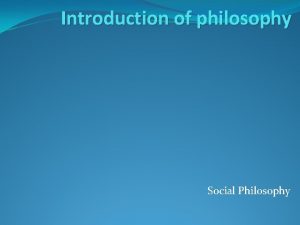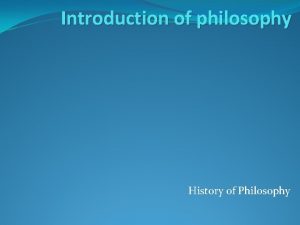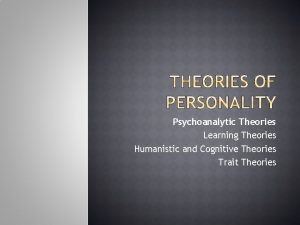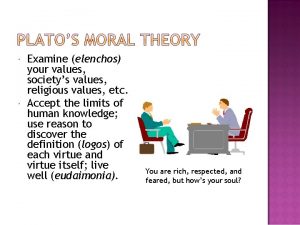Philosophy and theories of Nursing Values Conceptual Models







































- Slides: 39

Philosophy and theories of Nursing: Values, Conceptual Models, approach Presented by Mrs. Benazeera Lecturer Dept. Child Health Nursing, YNC

st Nursing in 21 century • Nursing is recognized as an academic discipline and a profession. • A move towards theory-based practice made contemporary nursing more meaningful and significant by shifting nursing’s focus from vocation to an organized profession. • More significance of evidence based practice. • Struggle to increase the knowledge base.

THEORY A set of concepts, definitions and prepositions that projects a systematic view of phenomena by designating specific interrelationships among concepts for purposes of describing, explaining, predicting and controlling phenomena.

NURSING THEORY Conceptualization of some aspect of nursing communicated for the purpose of describing phenomena explaining relationships between phenomena predicting consequences or prescribing nursing care.

COMPONENTS OF A NURSING THEORY Concepts Definition Phenomenon Assumption or proposition

Values of Nursing Theories

CHARACTERISTICS OF A THEORY v Interrelate concepts in such a way as to create a different way of looking at a particular phenomenon. v Must be logical in nature. v Should be relatively simple yet generalizable. v The bases for hypothesis that can be tested or for theory to be expanded. . . continued. .

CHARACTERISTICS OF A THEORY v Contribute to and assist in increasing the general body of knowledge within the discipline through the research implemented to validate them. v Used by practitioners to guide and improve their practice. v Consistent with other validated theories, laws, and principles but will leave open unanswered questions that need to be investigated.

IMPORTANCE OF NURSING THEORIES • Nursing theory aims to describe, predict and explain the phenomenon of nursing (Chinn and Jacobs 1978). • It should provide the foundations of nursing practice, help to generate further knowledge and indicate in which direction nursing should develop in the future (Brown 1964). • Theory is important because it helps us to decide what we know and what we need to know (Parsons 1949).

IMPORTANCE OF NURSING THEORIES • It helps to distinguish what should form the basis of practice by explicitly describing nursing. • The benefits of having a defined body of theory in nursing include better patient care, enhanced professional status for nurses, improved communication between nurses, and guidance for research and education (Nolan 1996). In addition, because


IMPORTANCE OF NURSING THEORIES • The main exponent of nursing – caring – cannot be measured, it is vital to have theory to analyze and explain what nurses do. • As medicine tries to make a move towards adopting a more multidisciplinary approach to health care, nursing continues to strive to establish a unique body of knowledge. • This can be seen as an attempt by the nursing profession to maintain its professional boundaries.

CONCEPTUAL MODEL

CONCEPT Complex mental formulation of an object, property or event that is derived from individual perceptual experience. It is an idea, a mental image or generalization formed and developed in the mind.

CONCEPTUAL FRAMEWORK &MODELS • Conceptual framework is a group of related concepts. It gives a over all view or orientation to focus thoughts. It can be considered as an umbrella under which many concepts can exist. • Conceptual models It is a term used interchangeably with conceptual framework. It is a graphical illustration or diagram conceptual frame work

• IMPORTANCE OF CONCEPTS INNURSING Models are representations of the interaction among and between the concepts • Conceptual frame work directs how the actions are carried out. • They provide an overview of the thinking behind theory and may demonstrate how theory can be introduced into practice. • Models are useful as they allow the concepts in nursing theory to be successfully applied to nursing

APPROACH TO NURSING THEORY

BASIC PROCESSES IN THE DEVELOPMENT OF NURSING THEORIES General System Theory It describes how to break whole things into parts & then to learn how the parts work together in “systems”. These concepts may be applied to different kinds of systems, e. g. Molecules in chemistry, cultures in sociology, and organs in Anatomy & Health in Nursing.

BASIC PROCESSES IN THE DEVELOPMENT OF NURSING THEORIES Adaptation Theory • It defines adaptation as the adjustment of living matter to other living things & to environmental conditions. • Adaptation is a continuously occurring process that effects change & involves interaction & response. Human adaptation occurs on three levels : 1. The internal (self) 2. The social (others) & 3. The physical (biochemical reactions)

BASIC PROCESSES IN THE DEVELOPMENT OF NURSING THEORIES Developmental Theory • It outlines the process of growth & development of humans as orderly & predictable, beginning with conception & ending with death. • The progress & behaviors of an individual within each stage are unique. • The growth & development of an individual are influenced by heredity, temperament, emotional, & physical environment, life experiences & health status.

METAPARADIGM - Most abstract level of knowledge. In nursing this is main concepts that encompasses the subject matter and the scope of the discipline - Central concepts of person, environment, health and nursing

METAPARADIGM • Is the most global conceptual or philosophical framework of a discipline or profession • It defines and describes relationships among major ideas and values • It guides the organization of theories and models for a profession.

METAPARADIGM OF NURSING THEORIS • Humans / • Individuals Society / Environme nt Health Nurse & Nursing

METAPARADIGM OF NURSING THEORIS • The concepts of nursing’s meta paradigm have been linked in four propositions (Donaldson and Crowley (1978) and Gortner (1980) • Person and health • Person and environment • Health and nursing • Person, environment and health

METAPARADIGM OF NURSING THEORIS • Person refers to a recipient of care with physical, intellectual, biochemical, spiritual, cultural and psychosocial needs, a human energy field, a holistic being in the world, an open system and integrated whole and adaptive system and a being who is greater than the sum of his parts (Wagner 1986).

METAPARADIGM OF NURSING THEORIS • Health is the ability to function independently, degree of wellness or illness experienced by the person, successful adaptation to life’s stressors, achievement of one’s full life potential, and unity of mind, body and soul ( wagner, 1986). Health has been a phenomenon of central interest to nursing since its inception.

METAPARADIGM OF NURSING THEORIS • Environment refers to all the internal and external conditions, circumstances, and influences that affect the person, significant others with whom the person interacts, and an open system with boundaries that permit the exchange of matter, energy and information with human beings (Wagner, 1986).

METAPARADIGM OF NURSING THEORIS • Nursing is a science, an art and a practice discipline and involves caring. Goals of nursing include care of the well, care of the sick, assisting with self care activities, helping individuals attain their human potentials and discovering using nature’s laws of health.

CLASSIFICATION OFNURSING THEORIES 1. DEPENDING ON FUNCTION Descriptive Explanatory Predictive Prescriptive To identify the properties and workings of a discipline To examine how properties relate and thus affect the discipline To calculate relationships between properties and how they occur To identify under which conditions relationships occur

DEPENDING ON THE GENERALISABILITY OF THEIR PRINCIPLES Meta-theory: theory of theory. Identifies specific phenomena through abstract concepts. Grand theory: provides a conceptual framework under which the key concepts and principles of the discipline can be identified.

DEPENDING ON THE GENERALISABILITY OF THEIR PRINCIPLES Middle range theory: is more precise and only analyses a particular situation with a limited number of variables. Practice theory: explores one particular situation found in nursing. It identifies explicit goals and details how these goals will be achieved.

BASED ON THE PHILOSOPHICAL UNDERPINNINGS OF THEORIES v. Needs theories. v. Interaction theories. v. Outcome theories. v Humanistic theories.

Needs theories • These theories are based around helping individuals to fulfill their physical and mental needs. The basis of these theories is wellillustrated in Roper, Logan and Tierney’s Model of Nursing (1980). • Needs theories have been criticized for relying too much on the medical model of health and placing the patient in an overtly dependent position.

Interaction theories • As described by Peplau (1988), these theories revolve around the relationships nurses form with patients. • Such theories have been criticized for largely ignoring the medical model of health and not attending to basic physical needs.

Outcome theories • These portray the nurse as the changing force, who enables individuals to adapt to or cope with ill health (Roy 1980). • Outcome theories have been criticized as too abstract and difficult to implement in practice (Aggleton and Chalmers 1988).

Humanistic Theories • Humanistic theories developed in response to the psychoanalytic thought that a person’s destiny was determined early in life. • Humanistic theories emphasize a person’s capacity for self-actualization. • Humanists believe that the person contains within himself the potential for healthy & creative growth.

Humanistic Theories • Carl Rogers developed a person –centered model of psychotherapy that emphasizes the uniqueness of the individual. • The major contribution that Rogers added to nursing practice is the understandings that each client is a unique individual.

List of Nursing Theory

 Blake and mouton leadership styles
Blake and mouton leadership styles Nursing informatics theories, models and frameworks
Nursing informatics theories, models and frameworks The living tree of nursing theories
The living tree of nursing theories Nursing theories
Nursing theories Criticism of von thunen model
Criticism of von thunen model Demographic transition model ap human geography definition
Demographic transition model ap human geography definition The neo-skinnerian model
The neo-skinnerian model Management models and theories
Management models and theories Theories and values of positive practice
Theories and values of positive practice Semimodals
Semimodals Conceptual physical and mathematical models are used to
Conceptual physical and mathematical models are used to Bruce maglino workplace values
Bruce maglino workplace values An individual's enduring tendency to feel
An individual's enduring tendency to feel Worldview in nursing
Worldview in nursing Functional nursing model
Functional nursing model Functional care delivery model
Functional care delivery model Western values vs eastern values
Western values vs eastern values It can only have one of two possible values: 0 or 1.
It can only have one of two possible values: 0 or 1. Define human value
Define human value Nursing theories related to teenage pregnancy
Nursing theories related to teenage pregnancy Introduction to nursing theories
Introduction to nursing theories Psychiatric nursing theories
Psychiatric nursing theories Salmon white’s construct for public health nursing
Salmon white’s construct for public health nursing 14 components of henderson theory
14 components of henderson theory Existential-phenomenological forces
Existential-phenomenological forces Essentials of nursing leadership & management
Essentials of nursing leadership & management Nursing+definition
Nursing+definition Evelyn adam conceptual model for nursing application
Evelyn adam conceptual model for nursing application Nursing management of ocd patient
Nursing management of ocd patient Pre and post operative nursing care of cataract
Pre and post operative nursing care of cataract Nursing diagnosis three parts
Nursing diagnosis three parts Nursing process in psychiatric nursing
Nursing process in psychiatric nursing Theories on growth and development
Theories on growth and development Molecular geometry and bonding theories
Molecular geometry and bonding theories Psychodynamic theory examples
Psychodynamic theory examples Permit easy reversal of actions
Permit easy reversal of actions Child development principles and theories answer key
Child development principles and theories answer key Chapter 6 theories of international trade and investment
Chapter 6 theories of international trade and investment Learning theories and program design
Learning theories and program design Chomsky krashen
Chomsky krashen

